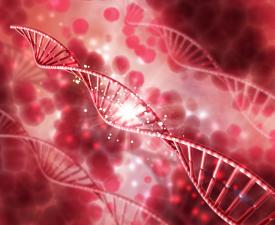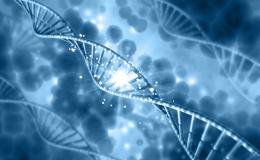Are Blood Cancers Hereditary?
September 1, 2020
Blood, or hematologic, cancers are characterized by uncontrolled multiplication of cancerous blood cells, which interfere with the function of normal blood cells. Blood cancers account for about 10 percent of all cancer diagnoses and are more common in men than women. Over 100 blood cancers have been identified. These cancers are classified as leukemias, lymphomas or myelomas, and can progress quickly (acute) or slowly (chronic), depending on the specific diagnosis. In recognition of Blood Cancer Awareness Month this September, we highlight new research identifying an increased risk of developing blood cancer in individuals with first-degree relatives diagnosed with the disease.

Clinicians have known for some time that certain blood cancers can run in families. In fact, researchers have identified twelve genes associated with hereditary (can be passed from parent to child) leukemia, the first of which, RUNX1, was discovered in 2008.1 More recently, a group of researchers took a unique approach to quantifying familial blood cancer risk by analyzing the medical records of 153,000 patients with blood cancer from the Swedish Family-Cancer Database without any prior knowledge of the patients’ family history of the disease.2 The study identified every patient with a blood cancer diagnosis and measured the risk associated with developing blood cancer as the patient’s first-degree relative (parent, sibling, child). Interestingly, the researchers found higher hereditary risks for the majority of blood cancers between first-degree relatives with the same blood cancer. The highest hereditary risks were associated with mixed cellularity Hodgkin lymphoma (standardized incidence ratio [SIR] = 16.7), lymphoplasmacytic lymphoma (SIR = 15.8) and mantle cell lymphoma (SIR = 13.3). Additionally, the study found that some blood cancers also increased the risk of developing other types of blood cancer in first-degree relatives. Chronic lymphocytic leukemia, for example, increases the risk of first-degree relatives developing other B-cell cancers and myeloproliferative neoplasms.
The researchers also discovered that higher numbers of first-degree relatives with a blood cancer diagnosis and an earlier age at the time of diagnosis also raise familial blood cancer risk, which is consistent with a genetic link to increased disease risk. Hereditary cancer syndromes, for instance, are also associated with a family history of cancer and diagnosis at a younger age. The authors note, however, that it is unlikely that the relatively rare mutations (changes in DNA sequence) observed in hereditary cancer and leukemia syndromes account for all of the increased familial risk observed during the study. Additionally, shared environmental exposures may account for some of the increased risk between first-degree relatives, but few environmental exposures have been established as clear risk factors for blood cancers. Together, the study results suggest that the genetic factors influencing familial blood cancer risk likely include both unidentified high-penetrance gene mutations (changes in genes that have a high likelihood of causing an affected individual to develop the disease) and variations in genes that are common in the population, which presents exciting new avenues of discovery for future blood cancer research.
Is blood cancer hereditary? Ultimately, the research study highlighted here determined that blood cancers with a hereditary link account for 4.1% of blood cancer diagnoses,2 which is similar to the incidences observed in hereditary breast cancer and adult hereditary leukemia.1 Most hereditary cancer tests screen for gene mutations associated with a variety of hereditary cancer syndromes, such as Li-Fraumeni syndrome, which is associated with an increased risk of developing leukemia and other cancers. As research discoveries are made, new genes and mutations associated with an increased risk of developing blood and other cancers will be added to comprehensive screening panels. Importantly, identification of adverse mutations that increase the risk of developing cancer allows patients and physicians to more effectively and proactively monitor for cancers associated with a particular gene mutation to potentially diagnose earlier, more treatable stages of the disease. To learn more about Kailos Genetics’ ExpedioTM Hereditary Cancer Screening, click here or contact us with any questions you may have regarding our genetic screenings.




